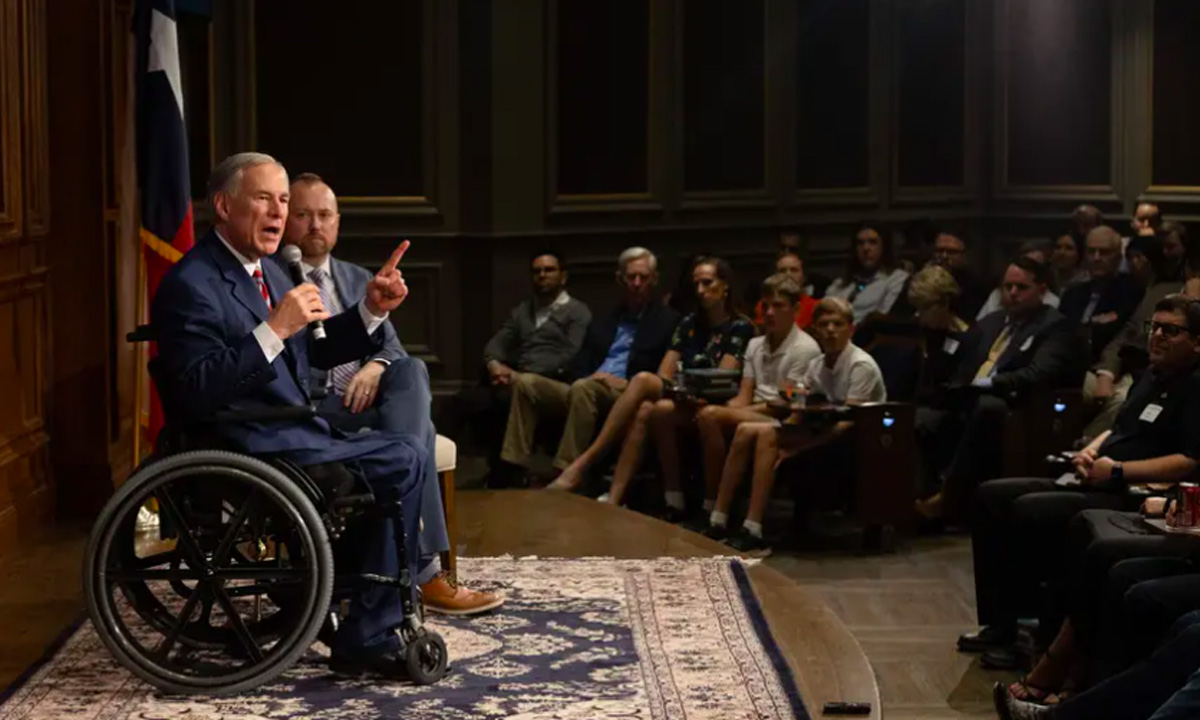Abbott to Add Teacher Pay to Special Session if Texas Lawmakers Pass School Vouchers
Teachers were the only state employees to not receive a raise in the regular session.

Get stories like these delivered straight to your inbox. Sign up for The 74 Newsletter
Just hours after the Texas Senate approved its priority school voucher bill, Gov. Greg Abbott said he would add teacher raises and public school funding to his special session agenda if the Texas Legislature passes vouchers.
Abbott, who spoke Thursday at a parental rights event organized by the conservative think tank Texas Public Policy Foundation, so far has listed education savings accounts, a voucher-like program, as the only education item in his agenda for the special session. Though lawmakers have already drafted a bill on public school funding — which was also cleared by the Senate on Thursday — it cannot pass unless Abbott adds the issue to his agenda. The school vouchers and funding bills now head to the Texas House.
“I want to make sure we provide a carrot to make sure this legislation gets passed,” Abbott said of vouchers. “Once [education savings accounts] are passed, I will put on the legislative agenda full funding for public education, including teacher pay raises for teachers across the state.”
During the regular session, lawmakers failed to pass a number of policies to support teachers amid a standoff over school vouchers. The stalemate came despite policy recommendations to better teachers’ working conditions from a task force assembled by Abbott last year to examine the state’s worsening teacher shortage.
Teachers were the only state employees to not receive a raise in the regular session and have said they feel their raises are being “held hostage” to a vouchers bill. Many have said they’d prefer to forgo a salary bump than see school vouchers implemented in the state.
Abbott, who took the stage at the summit just a few blocks from the Texas Capitol, said he thinks the House is at the “one-yard line” from passing education savings accounts. A coalition of Democrats and rural Republicans have historically blocked voucher legislation in the House.
Since before the special session, the governor’s office has been working with a group of House Republicans to draft a voucher bill that currently stands at 181 pages, Abbott said.
“I will not stop until we get [education savings accounts] passed in the state of Texas,” he added.
Earlier in the daylong event, several pro-voucher, Republican representatives laid out paths to passing the proposed bill in the House.
Rep. James Frank, R-Wichita Falls, said previous legislation has failed because voucher opponents, particularly teachers and superintendents, are “highly motivated” to stop the program.
“Some of the Republicans that aren’t voting for it are very scared to go against the school, principal, superintendent,” Frank said. “These are very well-connected people in every district in the state. Those are not people that you want to cross, if you can help it politically. I don’t like crossing them.”
Frank said he’s also spoken to rural representatives who argue that private schools either don’t exist in their district or are more expensive than the proposed $8,000 voucher. But if residents had access to money to specifically pay for private school, the market would respond by establishing schools that more closely fit their budgets, Frank said. He added that he would support a voucher closer to $10,000 to reflect the average cost of private schools in Texas.
To garner public support for vouchers, Rep. Ellen Troxclair, R-Lakeway, said advocates need to frame the program as giving taxpayers who opt out of the public school system their dollars back. Voucher opponents have often voiced concerns that an education savings account program would siphon away public school funds.
“I had a superintendent yesterday tell me, ‘How can you support public dollars going into private schools?’ And I said, ‘I just don’t agree with the premise of your question because it is parents’ dollars to begin with,’” Troxclair said.
Disclosure: Texas Public Policy Foundation has been a financial supporter of The Texas Tribune, a nonprofit, nonpartisan news organization that is funded in part by donations from members, foundations and corporate sponsors. Financial supporters play no role in the Tribune’s journalism. Find a complete list of them here.
This article originally appeared in The Texas Tribune, a member-supported, nonpartisan newsroom informing and engaging Texans on state politics and policy. Learn more at texastribune.org.
Get stories like these delivered straight to your inbox. Sign up for The 74 Newsletter

